
Jeffrey Lionel Dahmer, also known as the Milwaukee Cannibal or the Milwaukee Monster, was an American serial killer and sex offender who committed the murder and dismemberment of seventeen men and boys between 1978 and 1991. Many of his later murders involved necrophilia, cannibalism, and the permanent preservation of body parts—typically all or part of the skeleton.
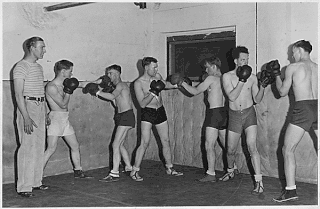
YMCA, sometimes regionally called the Y, is a worldwide youth organization based in Geneva, Switzerland, with more than 64 million beneficiaries in 120 countries. It was founded on 6 June 1844 by George Williams in London, originally as the Young Men's Christian Association, and aims to put Christian values into practice by developing a healthy "body, mind, and spirit".
The Charles Babbage Institute is a research center at the University of Minnesota specializing in the history of information technology, particularly the history of digital computing, programming/software, and computer networking since 1935. The institute is named for Charles Babbage, the nineteenth-century English inventor of the programmable computer. The Institute is located in Elmer L. Andersen Library at the University of Minnesota Libraries in Minneapolis, Minnesota.
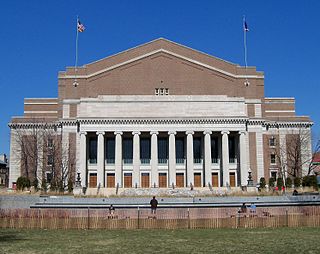
Cyrus Northrop Memorial Auditorium is a performing arts venue at the University of Minnesota in Minneapolis, Minnesota. It is named in honor of Cyrus Northrop, the university's second president. Various events are held within the building, including concerts, ballet performances, lectures, and graduations.
Ester Wier was an American writer.
The Ahlul Bayt Digital Library Project, established in 1996, is a non-profit Islamic organization that features work from a group of volunteers operating throughout the world. It operates the website Al-Islam.org – whose primary objective is to digitize and present quality resources related to the history, law, and society of the Islamic religion and its personalities – with particular emphasis on the Twelver Shi'ah Islamic school of thought. Al-Islam.org is a site that also serves as a means of introducing Islam to non-Muslims.
The College of Science and Engineering (CSE) is one of the colleges of the University of Minnesota in Minneapolis, Minnesota. On July 1, 2010, the college was officially renamed from the Institute of Technology (IT). It was created in 1935 by bringing together the University’s programs in engineering, mining, architecture, and chemistry. Today, CSE contains 12 departments and 24 research centers that focus on engineering, the physical sciences, and mathematics.

The College of Biological Sciences (CBS) is one of seven freshman-admitting colleges at the University of Minnesota, focused on research. Established in 1869 as the College of Sciences, the College of Biological Sciences is now located on both the Minneapolis Campus and the St. Paul Campus. The current dean is Valery E. Forbes.
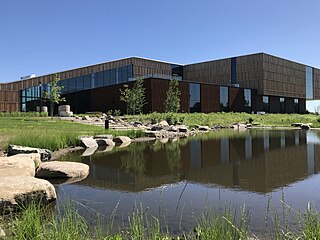
The Bell Museum, formerly known as the James Ford Bell Museum of Natural History, is located at the University of Minnesota. The museum's new location on the St. Paul campus opened July 13–15, 2018. The world-renowned Minnesota wildlife dioramas, numerous animal specimens from all over the world, and the 120-seat digital Whitney and Elizabeth MacMillan Planetarium theater are highlighted features of the new facility. The museum's former location in Minneapolis is closed as the work to move to the University of Minnesota's St. Paul campus began in January 2017. The museum is part of the University's College of Food, Agricultural and Natural Resource Sciences.
Mulford Quickert Sibley (1912–1989) was a professor of political science at the University of Minnesota.
Minitex is a publicly supported information and resource sharing program for academic, government, public and specialized libraries in the states of Minnesota, North Dakota, South Dakota, and with partners in Wisconsin and Iowa. Minitex was created as a pilot project, initially funded in 1968 through a grant from the Louis and Maude Hill Foundation and state and federal grant funds from the Minnesota State Department of Education.

The Jean-Nickolaus Tretter Collection in Gay, Lesbian, Bisexual and Transgender Studies is a collection of LGBT historical materials housed in the Special Collections and Rare Books section of the University of Minnesota Libraries. It is located underground in the Elmer L. Andersen special collections facilities on the University of Minnesota's Minneapolis campus. The Tretter Collection houses over 40,000 items, making it the largest LGBT archive in the Upper Midwest and one of the largest GLBT history collections in the United States. The collection is international in scope and is varied in media.
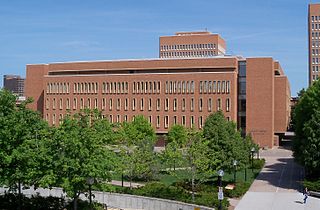
The University of Minnesota Libraries is the library system of the University of Minnesota Twin Cities campus, operating at 13 facilities in and around Minneapolis–Saint Paul. It has over 7 million volumes and 119,000 serial titles that are collected, maintained and made accessible. The system is the 17th largest academic library in North America and the 20th largest library in the United States. While the system's primary mission is to serve faculty, staff and students, because the University is a public institution of higher education its libraries are also open to the public.
Paul Chester Nagel was a historian and biographer who was best known for his works for general readers on the Adams and Lee political families, and who also wrote on the history of his home state of Missouri.

Walter Library is an academic library located on the East Bank campus of the University of Minnesota in Minneapolis, Minnesota. It currently houses the College of Science and Engineering Library and Dean's Office, the Digital Technology and Digital Media Centers, the Learning Resources Center, and the Minnesota Supercomputing Institute. Walter Library is situated along Northrop Mall, a grassy area at the center of campus that is bordered by the university's physics, mathematics, chemistry, and administration buildings, plus Northrop Auditorium.
Y's Men International is an international group of volunteers in support of YMCA. It was established in 1922 in Toledo, Ohio, U.S. and is now headquartered in Geneva, Switzerland. It was originally founded as a Service club to support the work of the World Alliance of YMCAs. The first club outside North America was formed in Shanghai, China in 1924.

Josephine Elizabeth Tilden was an American expert on pacific algae. She was the first woman scientist employed by the University of Minnesota. Tilden established a research station in British Columbia which lasted only until 1906. When Tilden became an assistant Professor in 1903, she was the first female scientist employed by the University of Minnesota. In 1910, despite not having a doctorate, Tilden was promoted to full professor.

291 Broadway, also known as the East River Savings Bank Building, is a 19-story high-rise building located at 291 Broadway and Reade Street in the TriBeCa neighborhood of Lower Manhattan, New York City. Designed by the architecture firm Clinton and Russell, the building originally housed the former East River Savings Bank. It served as the YMCA national headquarters from 1949 to 1980, and also housed the YMCA Historical Library during this time. The YMCA sold the building in 1980 when it decided to move the YMCA National Council to Chicago.
Punchinello Players, founded in 1914, was a theatre organization of the University of Minnesota. When it closed it was the second oldest student-run community theater in the U.S. Punchinello - located on the St. Paul campus - originated for the purpose of improving the lives of the greater community. As a university-associated theater it changed with the times and continued to explore and interrogate the human condition. Punchinello Players closed in 1994 due primarily to its home, North Hall, being slated for demolition.
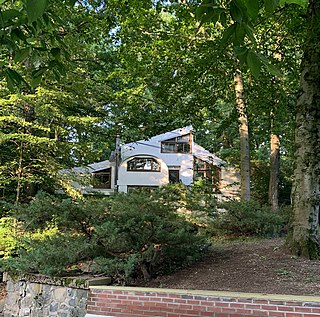
Valeria Stupnitsky Batorewicz was an American architect who specialized in prefabricated housing. Her most notable work, Environ A or the Plastic House, was a prototype for efficient, affordable, prefabricated housing in the mid-twentieth century that made early use of plastics as an architectural material.











